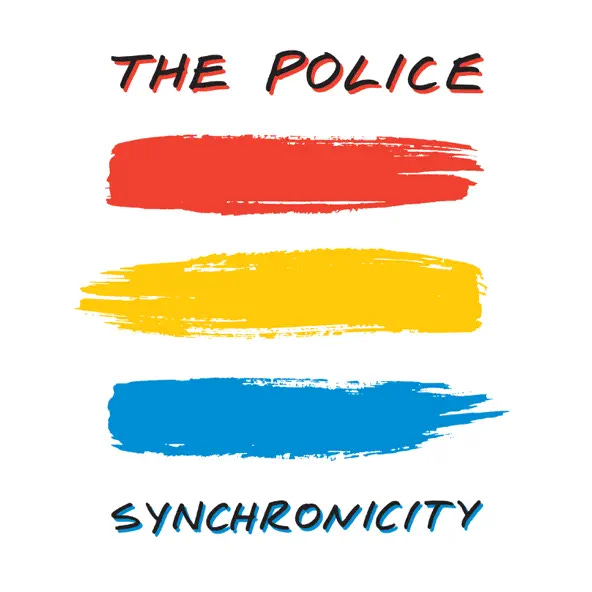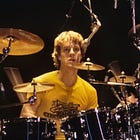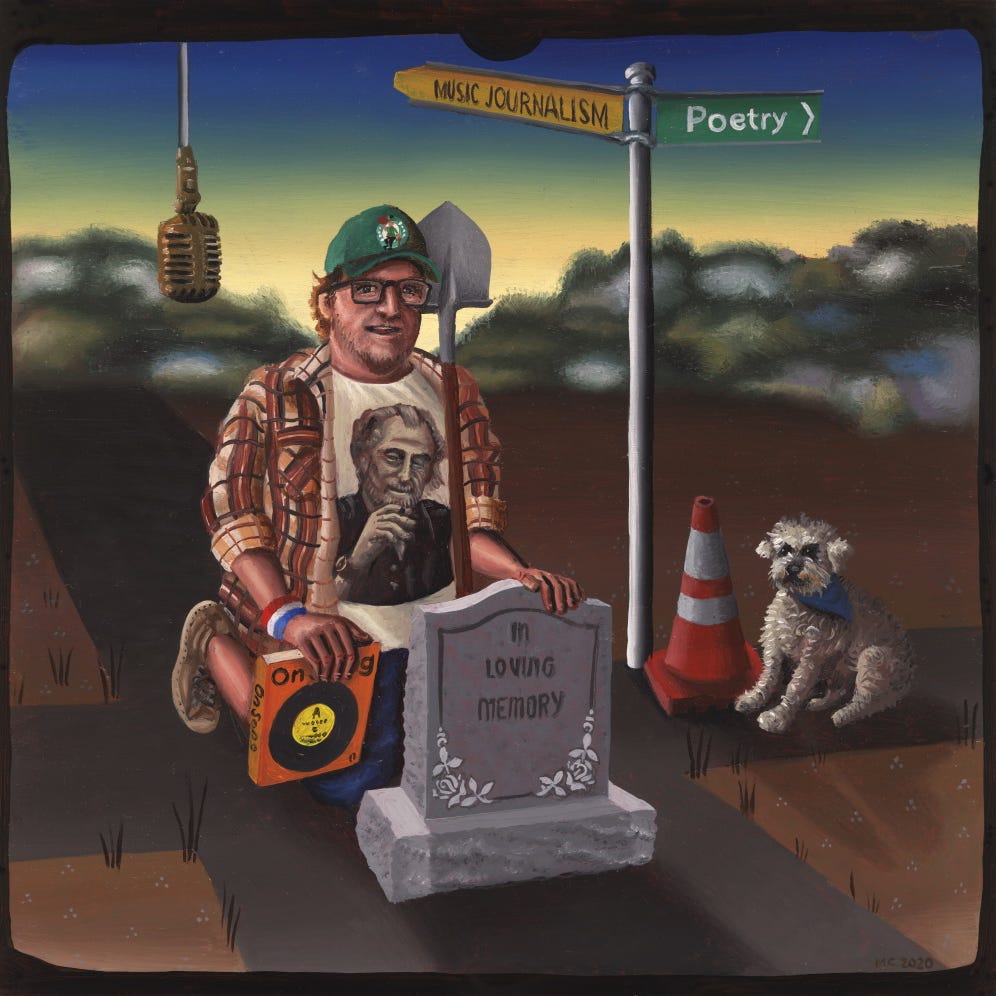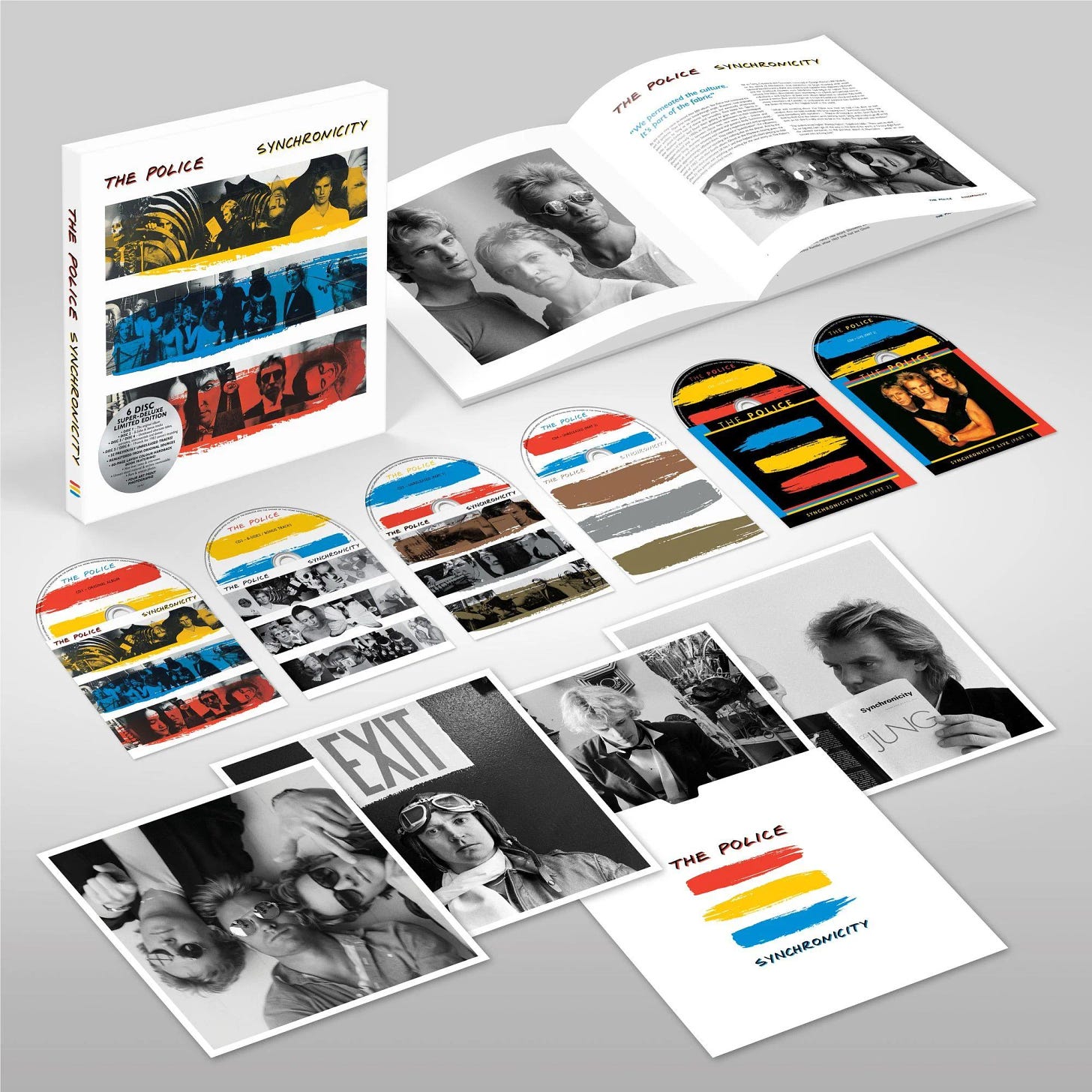The Police: Synchronicity - 40th Anniversary Edition/s
A review of the final Police album, reissued in various formats for its 40th Anniversary
The Police
Synchronicity: 40th Anniversary Edition/s
Polydor Records, a division of Universal Music Operations
It took me a while to click that Sting was, largely, a terrible lyricist. Then he outed himself with a book:
Since then, I’ve struggled to care, anywhere near as much as I used to, about the music of either Sting or The Police. With his erstwhile band, there’s always the drumming of Stewart Copeland to win me (back) over.
But the one Police record I love the most — and by quite a way — has always been the final album, Synchronicity. It is their best. There are some better songs on the other albums, but it’s their finest collection, and it stands up the best — 40 years on — because what it lacks in punk energy it makes up for in the fact that it’s not sitting in filthy white-reggae appropriation. This is when Sting got fully sophisticated as a writer, and a lot of people started hating him for that, and have never stopped. He was already fully pretentious (Don’t Stand So Close To Me’s Nabokov line was key evidence there) but it’s Synchronicity’s pop balladry — largely based around Sting’s bungling of the pyscho-babble of Arthur Koestler bungling Carl Jung — that seemed to bug the punks the most.
I’m okay with it.
But, you see, I was never caught up in all that. I was a kid when The Police were in their monumental rise, so I just grew up with all the Greatest Hits. They were all there at once for me. I really knew Roxanne and Walking On The Moon and Every Little Things She Does Is Magic and Message In A Bottle and Every Breath You Take as equals. They were all always on the radio. And when the actual Greatest Hits CD arrived, I listened to it like it was some revelation. Sting wrote all of the songs on the Hits album and was obviously the best.
A few years later, when I went all in on every album I realised it was Andy Summers’ guitar playing that was crucial, it was Copeland’s drumming that was brilliant; it was the fact that all three of them were combustible constantly that gave them (all) the edge.
Anyway, all of that is to say that Synchronicity always sat differently for me. It is the first obvious proof that Sting’s songs shine where the other two were just weird. It is the best cohesion of the group’s playing, having found a voice outside of what now sits as crude, ugly appropriation; it’s also the final vestiges of people barely speaking to one another — and the history of music is, in part, founded on great music being made by people in a bad mood with each other.
Synchronicity is also, oddly, bottom-heavy. It starts off in light mode, Sting eager to show off this new word he’s learned — the album’s title, the Jung-ian theory — by using it as the title for two seperate songs, which are both good, but are barely there. They whiz by, as do the songs Walking In Your Footsteps and O My God. Well, Walking does not whiz, but it is most certainly an example of Sting’s lyrical stupidity.
Hey Mr. Dinosaur
You really couldn't ask for more
You were God's favorite creature
But you didn't have a future
No, really. That verse gets a carry-on that’s possibly even dumber:
Hey mighty brontosaurus
Don't you have a lesson for us
You thought your rule would always last
There were no lessons in your past
You were built three stories high
They say you would not hurt a fly
If we explode the atom bomb
Would they say that we were dumb?
It’s hard to believe Sting was ever a teacher, this feels like he’s still very much sitting on the mat. But fuck, this song, and O My God manage to work because of the components offered by his other players. Copeland is at his creative best varrying the tempos, playing polyrhythms, hearing harmony and melodies in and around his drumlines, reacting, teasing, and uplifting. Summers has more sparkle and jangle, less jank and upstroke.
Side one of the album is utterly bonkers though because when Summers and Copeland are given the keys to take things for a brief spin they respectively offer Mother and Miss Gradenko. I always thought Grandenko was cool because of Stewart’s playing, whereas Mother was just bizarre. The runoff from a therapy session gone wrong.
It’s funny what happens when you listen to something with the knowledge that it’s now 40 years old — Mother makes more sense now than it ever did. It’s still not ‘good’ (at all) but it makes more sense.
But it’s still entirely about what Sting saves for side two.
In a row, as if auditioning for a Greatest Hits album to be made out of only the new songs he throws out Every Breath, King of Pain, Wrapped Round Your Finger, Tea In the Sahara and Murder By Numbers.
Every song benefits entirely from his colleagues and what they elect to add. Copeland is at his best several times on this record, Pain and Finger and Sahara have him exploring percussive curiosity, and Murder By Numbers has both Copeland and Summers taking their earlier white-reggae shtick and turning it into its own fusion-version of jazz. It’s a thrill-ride, and one of Sting’s best vocals.
So what else do you get with this 40th Anniversary version (or versions)?
Well, the 6-disc edition (digital and CD) is one of the few times you get a peek into the vaults. There are b-sides and demos, some alternate versions that show how often the Sting songs absolutely needed the dynamics of the band, and possibly deserved a co-writing credit or two to be tossed to Andy or Stewart. You might tire, quickly, of the studio songs that were in the cupboard. Unless, of course, you’ve read this far. Because that says you’re interested enough.
But you will get the full Oakland Colliseum show on audio across the final two discs of the set, and this is useful; the band on fire so fully. The video of that show has been around for ever, but it’s nice to have clean audio to enjoy.
There is a simple 2CD version (just the album and some B-sides) and you get that with the vinyl too, across 1-LP, 2-LP and 4-LP versions.
Look, you don’t need this, unless you do! A review isn’t going to sell you on it I don’t think. It’s only going to alert you to its existence.
But I’ve been playing this album more across the last few weeks than I have in years. And I feel no shame. I marvel, every time, at what that drummer is doing, at how good Sting’s voice is, and his bass playing — phenomenal. And Andy too, sure, absolutely.
And, weirdly, now, I love the weird songs almost more than the straight ones. And I can handle hearing Every Breath You Take more than I’ve been able to in at least 30 years. There’s some masterpieces here. It’s undeniable when you sit and listen. And maybe the math-work of picking through the offcuts is only a oncer or a now-and-then dip of the toe, but I’m interested, always, in hearing Police offcuts. It gives us the real clues. It shows us that there was alchemy in the way the three of them combined their powers.









